by [email protected] | Jun 2, 2021 | Prescriptions for your Practice
Podcast: Play in new window | Download
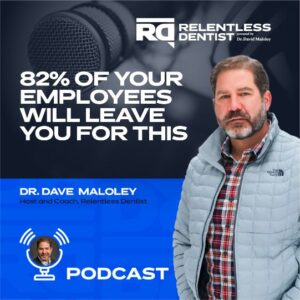 “We have two ears and one mouth so that we can listen twice as much as we speak.” — Epictetus
“We have two ears and one mouth so that we can listen twice as much as we speak.” — Epictetus
Listening is the single most essential skill in business, particularly in dental practice. Poor listening skills may lead to assumptions and misunderstanding that will eventually result in ineffective decisions and costly mistakes. It further deteriorates team cohesion and causes a lot of tension and stress.
Effective listening should be attentive, responsive, and active. Pay close attention to non-verbal expressions to understand and decode the messages correctly. Functional listening promotes healthy organizational relationships, encourages creativity and innovation, and fosters a positive culture among employees and the organization.
In this episode, I will talk about dental business owners retain great employees, nurture their growth, and provide them with tools for success to keep them dedicated to their practice, your leadership, and your customers — all because of active listening.
Tune in and find solutions to common dental practice issues at Prescriptions for Your Practice
Key Quotes:
- “When somebody leaves the nest and they graduate, these parents extend the trust that they will find good workplaces that take care of them.”
- “Good employees leave and you think that they leave for more money, but that’s not the case.”
- “The first key to active listening is giving someone all of your attention.”
- “The second step is to step into the conversations with genuine curiosity.”
- “Active listening means digging deeper because they don’t know how to articulate themselves and you need to ask exploratory questions.”
- “If you’re able to listen and they’re able to be heard, sometimes that’s enough for their needs to be met immediately.”
- “If you give your team, your patients, an undivided attention and you dive deeper to fully understand them, they will be committed and loyal to you and you can continue this reciprocal exchange because the offspring of active listening is trust.”
Featured on the Show:


by [email protected] | May 26, 2021 | Prescriptions for your Practice
Podcast: Play in new window | Download
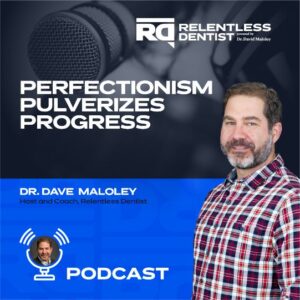
Where in your relationships, your health, your financial situation, your clinical dentistry, can the realism of progress take precedence over the fantasy of perfection?
At one point in our life, we have been in a situation wherein we strive to be perfect, only to realize that it is only an illusion that we put upon ourselves out of fear of criticism and rejection.
The key to perfection is acknowledging that it doesn’t exist.
Perfection is fiction, and it can be destructive. I’m not saying that you should lower your standards. Set high standards and strive for excellence, not perfection. You can only achieve success through progressive action.
Listen in as I discuss pointers on how you can identify areas of your life or business where the standard of “perfection” should be replaced with progress.
Tune in and find solutions to common practice issues at Prescriptions for Your Practice
Key Quotes:
- “When it came time for me to cross the finish line, I looked up at my time and the critic turned on, and I was starting to think of ways that should have improved my time and why the time wasn’t good enough. The standard of finishing immediately changed, and I was looking for opportunities where I could have perfected that run.”
- “That is a metaphor for a lot of or our lives. Where is that perfectionism that we’re trained to notice these meticulous details in the mouth, the dentistry that we’re doing, the margins, the bone levels? We’re down to millimeters and microns and that works really well in dentistry, but it can create all sorts of problems with their teams, with their families, in our life.”
- “We create these environments where there’s learned helplessness because our team thinks ‘Well, I can never live up to the doctor’s standards so why even try? I’m not even gonna put up the effort because I’m getting criticized.’ So, it starts to hamper our relationships.”
- “What is perfect? The reality is it doesn’t exist.”
- “The solution isn’t to really lower your standards. But we have to appreciate that the path to mastery is messy. Whenever you start on anything, you suck at it. So you have to give yourself permission to suck and get better, and better, and better.”
- “The solution is making peace with imperfection and falling in love with process and progress.”
- “Human desire isn’t perfection, it is connection.”
- “Understand that we have to change habits to change identity. Once we start to build that confidence, then the success and the progress are inevitable.”
- “Perfection leads to procrastination.”
Featured on the Show:


by [email protected] | May 19, 2021 | Prescriptions for your Practice
Podcast: Play in new window | Download
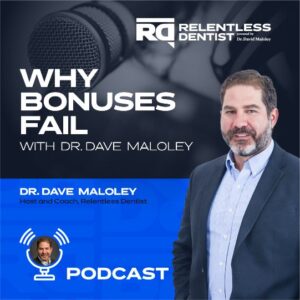 Have you been scouring the internet trying to look for the best reward system for your employees? Let me tell you a secret; there’s none! I’ve tried different approaches, many times myself, and they didn’t work.
Have you been scouring the internet trying to look for the best reward system for your employees? Let me tell you a secret; there’s none! I’ve tried different approaches, many times myself, and they didn’t work.
The bonus system aims to give out incentives (monetary or otherwise) to motivate employees to bring out their best and be productive. However, this kind of approach is counterproductive and not to mention expensive.
If you’re looking for a perfect incentive system for your employees, you should not miss out on these three elements: alignment, belonging, and healthy conflict. A reward system should not curb creativity and risk-taking. Once it’s manipulative and punitive, it will predictively fail 100%.
Tune in and find solutions to common practice issues at Prescriptions for Your Practice
Key Quotes:
- “What’s the best bonus system out there? And the short answer, the bottom line up front, is that there is no such thing.”
- “If you work from that mental frame, work for wages, then you immediately assume that if I give more wages, if I give an incentive or bonus program, then I have a better team and I’ll get more and better work… it just doesn’t work.”
- “Modern research says that bonus systems suck, and it can actually demotivate employees, or worse, motivate them to be egocentric, to work on their own self-interests.”
- “Most people are looking for alignment, belonging, and healthy conflict.”
- “You, as the practice owner, are completely limiting the effectiveness of your team if it’s a top-down approach.”
- “If we don’t first fulfill those common human needs, a bonus system will likely be expensive at best, counterproductive at worst.”
- “I really didn’t have the practice or team that I dreamed of until I really dug into the science of human potential, the science of organizational behavior.”
- “No bonus system can match the internal motivations of your team.”
Featured on the Show:


by [email protected] | May 12, 2021 | Prescriptions for your Practice
Podcast: Play in new window | Download
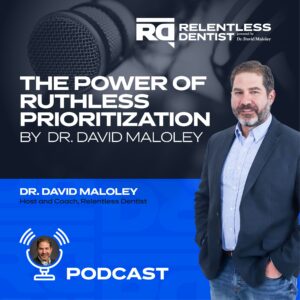
Stephen Covey was spot on when he said, “The key is not to prioritize what’s on your schedule but to schedule your priorities.”
If you want to make more with less work, you need to leverage the principles of ruthless prioritization, that is, eliminating anything that does not add value toward achieving your goal.
Sometimes, you need to get rid of the good to focus on the great.
In this episode, I talk about the aggressive and scary move I made in 2016 to carve back some personal time from my workdays and still able to grow my practice. I’ll also discuss how to find the hidden potential in life’s harsh realities of unfairness. And as a bonus, I’ll share with you 5 highly recommended books to guide you on how you can make more by working less.
Tune in and find solutions to common practice issues at Prescriptions for Your Practice
Key Quotes:
- “You can make more and work less each and every year by leveraging the principles of ruthless prioritization.”
- “The reality is that the world is incredibly imbalanced and you have to embrace the harsh realities of ‘unfairness’.”
- “Sometimes you need to get rid of the good so you can focus on the great.”
- “Document and focus on the things that really create a lot of focus and power and the things that are disempowering.”
- “If you are going to chisel your big patients based down to one person who would you start with?”
- “If you give all your time and attention trying to fix your bottom performers, you’ll ultimately end up losing some of your best talents.”
- “How can you eliminate, delegate, automate the bottom few [assignments]? How can you find more time and focus in the top few [assignments]?”
- “Who are your multipliers? The ones who naturally align with your core values and mission and get you consistent results.”
Featured on the Show:


by [email protected] | May 5, 2021 | Prescriptions for your Practice
Podcast: Play in new window | Download
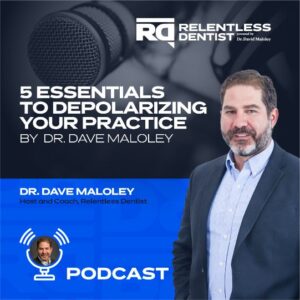 How do we secure a productive environment in our practices? One that doesn’t get disrupted by the increasing tension in society and result in a toxic culture that could compromise your livelihood?
How do we secure a productive environment in our practices? One that doesn’t get disrupted by the increasing tension in society and result in a toxic culture that could compromise your livelihood?
Let’s engineer a work environment that brings out the best in you and your team!
In this episode, I talk about the imminent changes in the dental profession that are big long-term wins if we start enhancing our company cultures. I’ll also discuss how to keep your team innovating and encourage your employees to grow their confidence, improve engagement, and experience joy at work.
Tune in and find solutions to common practice issues at Prescriptions for Your Practice
Key Quotes:
- “Our dental practices are a microcosm for society. Unless we create systems for safety and alignment for our teams, that polarization will create a very toxic culture and undermine your livelihood.”
- “In all (economic) climates, it’s important that you, as a practice owner, are building your confidence and that of your team.”
- “Personal issues manifest as work issues all of the time.”
- “If there aren’t systems for frequent and open dialogue, there’s a very good chance there’s some toxic behaviors hidden from you, the doctor. Those are the ones that explode and hurt you, patient care, and others on the team.”
- “Make sure you have some sort of no gossip policy.”
- “Make sure that you have systems for recognition.”
- “If you, the doctor, don’t engineer an environment that brings out the best in you, patient care and your pay will eventually take a hit.”
Featured on the Show:


by [email protected] | Feb 17, 2021 | Prescriptions for your Practice
Podcast: Play in new window | Download
 After a significant family loss, Dr. Meghna Dassani was driven to find solutions and treatments for breathing disorders. She joins the show today to share her key findings and processes that she implemented in order to solve disordered breathing for patients of all ages. You will be inspired by her passion and incredible story of problem-solving and growth.
After a significant family loss, Dr. Meghna Dassani was driven to find solutions and treatments for breathing disorders. She joins the show today to share her key findings and processes that she implemented in order to solve disordered breathing for patients of all ages. You will be inspired by her passion and incredible story of problem-solving and growth.
Listen in as Meghna discusses multiple issues, from behavioral problems in children to low energy issues in adults, that are often misdiagnosed. You will hear how she has found real solutions to many of these mistreated problems and added years to the lives of her family members and patients, as well as how her unique solutions help to treat breathing issues and ensure quality sleep.
Tune in and find solutions to common practice issues at Prescriptions for Your Practice
Key Quotes:
- “My favorite thing to tell people is that there’s no such thing as a bad kid. What we have is a tired kid. The signs and symptoms of a child that is tired and sleep-deprived are the same as a child that is diagnosed with ADD or ADHD.”
- “I tell parents that we are the quarterback. We are going to guide you, provide traffic control on what needs to be done because, especially in children, it’s a group effort.”
- “Those severe patients you were talking about—not all of them can use the CPAP. If you can use it, that’s amazing. If not, I have a solution to help you.”
- “That’s my favorite thing to do for patients: let them connect the dots and take their health into their own hands.”
- “My team sees this impacting our patients’ lives as their legacy. I could not ask for more. You empower them to help the people they see every day.”
- “It comes down to systems. If you have the right systems in place, it’s very predictable. It can be done consistently and successfully. Yes, you get paid, and yes, it can be profitable.”
Featured on the Show:


 “We have two ears and one mouth so that we can listen twice as much as we speak.” — Epictetus
“We have two ears and one mouth so that we can listen twice as much as we speak.” — Epictetus



 Have you been scouring the internet trying to look for the best reward system for your employees? Let me tell you a secret; there’s none! I’ve tried different approaches, many times myself, and they didn’t work.
Have you been scouring the internet trying to look for the best reward system for your employees? Let me tell you a secret; there’s none! I’ve tried different approaches, many times myself, and they didn’t work.
 How do we secure a productive environment in our practices? One that doesn’t get disrupted by the increasing tension in society and result in a toxic culture that could compromise your livelihood?
How do we secure a productive environment in our practices? One that doesn’t get disrupted by the increasing tension in society and result in a toxic culture that could compromise your livelihood? After a significant family loss, Dr. Meghna Dassani was driven to find solutions and treatments for breathing disorders. She joins the show today to share her key findings and processes that she implemented in order to solve disordered breathing for patients of all ages. You will be inspired by her passion and incredible story of problem-solving and growth.
After a significant family loss, Dr. Meghna Dassani was driven to find solutions and treatments for breathing disorders. She joins the show today to share her key findings and processes that she implemented in order to solve disordered breathing for patients of all ages. You will be inspired by her passion and incredible story of problem-solving and growth.